- Home
- Deborah Blum
The Ghost Hunters Page 19
The Ghost Hunters Read online
Page 19
Mr. A. Y. Sittings: “At the first interview several remarkable phenomena occurred. Although I was introduced by another name, my true name was early given and some incidents of my life stated which could not have been known to the medium.”
Mr. E. D. C. Sitting: “The communications I had through Mrs. Piper were of such a nature, I should hardly like to put on paper. I will say, however, that I went there totally unknown to her, and the names she called and the facts she spoke of, known only to myself and those who are no longer here, astonished me beyond measure, for I had never before visited a medium or seen anything of the kind.”
Dr. C. W F. Sittings: “At my third sitting, ‘Phinuit’ said: ‘William Pabodie sends his love, says he has suffered remorse of conscience and if he had to live his life over again, he would not do what he did.’ ”
The doctor had driven from Rhode Island for the sitting. William Pabodie was a friend of his who had committed suicide almost twenty years earlier.
Mr. J. R. R. Sitting: He handed the medium the collar of a dog he had once owned, asking “Phinuit” if there were dogs where he was. “Thousands of them,” he said, then suddenly he cried, “Here is your dog coming, a long way off. You call him.
“I gave my usual whistle.
“Here he comes.... Rover, Rover, no G-rover, Grover, that’s the name.”
The dog was once called Rover, but was changed to Grover in honor of the 1884 election of President Grover Cleveland.
And then there was the sitting with William’s wife, Alice, and his younger brother, Robertson James, on the morning of March 6, 1889. The brothers’ aunt Kate—their mother’s sister—had been ill, and Alice asked about her health.
“She is poorly,” Phinuit replied shortly. Alice confessed to being disappointed by the baldness of the answer. She was just planning to ask again when the medium suddenly threw back her head and said, in a startled way, “Why Aunt Kate’s here. All around me I hear voices saying, ‘Aunt Kate has come.’ ”
When pressed, Phinuit told them that Kate Walsh had died very early that morning. He just wasn’t sure about the precise time, maybe around 2:00 a.m. or so.
The sitting made Bob James so nervous that he went directly from Mrs. Piper’s house to Hodgson’s office in downtown Boston. As he’d hoped, he found his brother William there, deep in conversation. On hearing the account, Hodgson immediately wrote a statement of what had happened, noting date and time, and adding, “This is written before any dispatch has been received informing of the death.” He insisted that it be signed by all three of them.
The meeting broke up shortly, and James returned home. A few hours later, he received a telegram from his cousin. His aunt Kate had died early that morning, a few minutes after midnight.
It was one more mystery for William James to take to the meeting in Paris.
“I AM QUITE thick now with Sidgwick, whom I like amazingly, odd as he is,” James wrote to his wife from the Congress of Experimental Psychology.
Sidgwick had charmed James with his unself-conscious sweetness. James had enjoyed watching the fifty-year-old British philosopher keep up his exercise program, jogging down the Paris streets with coattails flapping behind him. He’d admired Sidgwick’s shy effort to overcome his stutter: “It was pitiful to hear him try this a.m. to express himself in French, with his bad choice of words, his bad accent and his fearful stammer. Myers did quite well, and I not so badly.”
All three of them, and Richet as well, argued to expand the Census of Hallucinations into an international program, resulting, James said, in a “somewhat stormy” session. The “orthodox” scientists resisted the idea strenuously, even ones that they’d expected some support from, such as Pierre Janet, Richet’s colleague in hypnotism studies. Janet explained that he didn’t want to see his research associated with ghouls and ghosts and goblins. In the end, James and his friends mostly prevailed. The Swiss, the Germans, the Italians, and—unexpectedly—the Brazilians had agreed to conduct surveys in their countries as well. James was now, somewhat to his dismay, the official coordinator for the U.S. part of the census. A report was due at the next meeting of the congress, in 1892.
As James wrote to his wife, he’d found the session much more energizing than the usual research conference: “The whole thing is amusing and exciting to the last degree—so much that I have got quite out of the state of torpor into that of jiggle and am lying awake at a bad moment.” At least the insomnia gave him a moment in which to write home.
“A CURIOUS CHAPTER might be written on the pseudo-confessions of mediums,” Charles Richet wrote late in his life, ruminating on the downward trajectory of the Fox sisters.
As a class, mediums were notoriously unstable, he noted. Their abilities, if genuine, were unreliable and erratic. Even the good ones tended to eventually suffer from the decline effect. The weirdness of their profession often produced mental problems, if those didn’t already exist. The whole realm of psychic powers impressed Richet as transient, an ephemeral grasp on something in the air, which came and went, one of the problems with studying them. The Fox sisters, late in life, seemed to encapsulate every quality that made mediums so difficult.
In November 1889, Maggie Fox Kane confessed again, retracting her earlier confession to the New York World. This time, she insisted to the New York Press that her statements about faking the spirit sounds had been “false in every particular.” She had made up the story for money, she said. She had done it for “promises of wealth and happiness in return for an attack on Spiritualism,” and she was sorry to say that she’d reaped neither of those rewards. She wanted readers to know that she had not been paid to grant this later interview; she hoped merely to undo the damage she had done to her own reputation, to her sisters, and to the credibility of her profession: “Would to God that I could undo the injustice I did the cause of Spiritualism.”
Richet suspected that the truth about the Fox sisters lay somewhere in that welter of claims and denials. It was possible that when young and relatively unspoiled, the Fox girls had possessed some mediumistic talents. It was possible that whatever small ability they possessed had failed long ago, lost in the circuslike promotion that surrounded them.
It would have demanded extraordinary courage, not to mention upright character, for these mediums in particular to confess to a decline effect, to announce that their much-heralded abilities had vanished long ago. Richet didn’t find Kate and Maggie particularly upright; he doubted they had ever been notably talented. They were, however, a cautionary tale to mediums and investigators alike: “That the Fox sisters, after the enormous developments of spiritualism that followed on their early demonstrations, should have tricked is possible or probable, not to say certain.”
IT WAS SOME weeks after the death of James’s aunt that Mrs. Piper suddenly grabbed Hodgson’s right hand. Her grip was painfully tight; Phinuit seemed to have suddenly disappeared. The voice speaking was that of a woman, terrified, speaking in a desperate whisper.
“Help me, help me,” she said. “I’m so cold.” She tugged at him with her right hand, pulled until he grasped her left hand.
“That hand’s dead—dead—this one’s alive.” Her left hand seemed icy cold to him; her right had been hot and clammy.
“Who are you?” he asked
“Kate Walsh,” she replied
It was so different from the other Piper sittings, Hodgson told James. It was intimate and, somehow, terrifying. “It was the most strikingly personal thing I have seen.” James followed up by writing to his cousin Elizabeth, daughter of his late aunt Kate Walsh, and asking if any of it made sense to her.
Yes and no, Elizabeth wrote back. Her mother had suffered a partial paralysis as she lay dying. One of her hands had been “dead,” but Mrs. Piper had the side wrong. It had been her right side that was paralyzed, not her left. It might be that the medium was describing a spirit still feeling the effects of a last illness, but the sensations had come through somewhat garbled. “Queer busi
ness,” James wrote to Hodgson, eerie and uncomfortable in its effect.
And yet, as they both knew, mediums were unreliable creatures. The Fox sisters had reminded them of that, and in spades. Perhaps he and Hodgson had become too close to Mrs. Piper, too seduced by the rather sedate contrast she provided to the generally seedy community of mediums. Perhaps they were losing their perspective. Perhaps despite their precautions, she had found a way to outwit them, here in Boston on her home turf.
Almost simultaneously, James and Hodgson came up with the same idea. They would send her to England, put Gurney’s “intractable Atlantic” between her and any regular sources of information and support. They would see what happened to their “Yankee girl,” as James affectionately called her, in a place not her home.
7
THE PRINCIPLES OF PSYCHOLOGY
T. H. HUXLEY—among the most intellectually confident of nineteenth-century men—had no difficulty, was proud even, to confess that he felt ignorant in one notable area. He first made his confession at an 1869 meeting of the Metaphysical Society, a club of Britain’s leading intellectuals, with membership dominated by theologians, scientists, and philosophers, spanning John Tyndall to Henry Sidgwick.
The Metaphysical Society held discussions ranging from “The Scientific Basis of Morals” to “Has a Frog a Soul?”. Huxley’s talk was titled “Is God Unknowable?”, and in it he described his perspective on religion as “agnostic” (from the Greek agnostos, “unknowable”). Where the gnostic writers of Christian history claimed spiritual knowledge as essential to salvation, this champion of scientific materialism claimed no knowledge. There could be no knowledge, Huxley believed, when there was no proof.
The more nineteenth-century science illuminated mysteries of the universe, the less likely it appeared to Huxley that solutions to those mysteries lay beyond physical reality. Besides that, his labors on behalf of Darwinian science had left him less than impressed with the intellectual powers of his fellows. Was it even possible that this meager species, saddled with finite perception, finite intelligence, could comprehend a reality unbounded by physical limits? He doubted it. Huxley insisted that the rational mind must investigate, must seek hard evidence. But in the absence of such evidence, he viewed doubt, not belief, as the responsible stance.
Twenty years later, in 1889, Huxley took that confession of unbelief even further, in a widely read book, Christianity and Agnosticism, which made it clear that the intervening time had reinforced his doubt, intensified his impatience with those who refused to join him in doubting.
Agnosticism, Huxley wrote, should not be considered a creed. It was a method, or if one preferred, a scientific principle: nothing is certain unless it is proved. Thus, if one could not confirm the literal existence of angels, spirits, gods, they must be doubted. The agnostic did not close his mind to possibility; he simply set the standards of reality high. Very high. No supernatural agency had met Huxley’s burden of proof.
Indeed, Huxley saw science as directly contradicting supernatural explanations. Astronomers had thoroughly overturned the concept of an Earth-centered universe, once essential to Christian thought. Throughout the nineteenth century, Earth’s importance—and correspondingly, mankind’s place in the universe—had further diminished. This planet was one of eight in our solar system (the most distant, Neptune, having been discovered in 1846). Our sun was one of millions, if not billions, of stars in the Milky Way galaxy, which now appeared to be itself one of countless galaxies. Rather than the center, God’s favorite, one of a kind, Earth appeared but an insignificant part of a vast material universe. Each glimmering star, each celestial object found, Huxley wrote, revealed another “world in course of development or retrogression hanging out its light signal in the ocean of infinity.”
Physical man, Huxley continued, was “mere dust in the cosmic machinery, a bubble on the surface of the ocean of things both in magnitude and duration[,] a by-product of cosmic chemistry.... He fits more or less well into this machinery, or it would crush him. But the machinery has no more special reference to him than to other living beings.” In the debate over whether the scientific worldview should replace religion, Huxley considered the answer already given. It had.
William James, Henry Sidgwick, and their fellows, although they also counted themselves as rationalists, could not go nearly so far. To exclude from reality anything not demonstrated through the scientific method was to accept on faith, they would argue, that there is no reality beyond what a select group of people (on an insignificant planet) say is so. To deny the existence of the spirit—without thoroughly exhausting the subject through dogged research—to accept such arbitrary limits, was to them a prejudicial view, closed-minded and unscientific.
Yet as much as the psychical investigators—led by philosophers, after all—were motivated by grand principles, by the metaphysical generalities at the center of their quest, they constantly found their energies drained by small particulars. In the fall of 1889, the particular problem was the stubborn behavior of a certain Boston medium.
Mrs. Piper rejected all calls to duty or to higher purpose and flatly refused to travel to England. Yes, she could see the importance to advancing psychical research. She appreciated the researchers’ enthusiasm for her abilities. As she kept repeating, however, her husband, William, “would not hear of being left alone, subject only to the ministrations of a housekeeper.” Her daughters, Alta and Minerva, were too young to be left without a mother. She was sorry, but family took precedence over explorations of spirit communication.
To change her mind required weeks of effort, the combined persuasive talents of James and Hodgson, their exhortations that Mrs. Piper consider the contribution she could make to history, to human knowledge, and to the understanding of her own abilities. Even so, she said a reluctant yes only after the SPR agreed to send her children along with her on the journey. Her husband’s parents helped the cause by inviting him to stay at their home in the new Boston suburb of Arlington Heights during his family’s absence.
Fred Myers wrote a letter that sang with relief: “Dear Mrs. Piper—I am so very glad you are coming after all! And we will do our best to make your visit pleasant.” Seeking to boost her spirits, James invited her and Hodgson for a pre-departure visit to his country home in the New Hampshire countryside she loved so well. Chocorua was outstandingly lovely that October. The surrounding wooded hills were set with the gemstone colors of autumn—amber and carnelian, garnet and citrine—heart-stoppingly brilliant against a clear blue sky. They spent the days actively, out of doors, saving serious talk for the evenings. Mrs. Piper hiked with James and fished with Hodgson. (Since James disliked family fishing expeditions, the Australian was in the habit of taking James’s children out on Lake Chocorua to try for bass.)
The quiet, sun-touched days confirmed both men’s impression of their subject as unguarded, basically uncomplicated, nice. Nothing about her pointed to a schemer, a confidence artist. Her powers, whatever they were, seemed as much a mystery to her as they were to James and Hodgson. The medium side of her life made her uncomfortable, fearful of appearing foolish, uneasy about what happened during her trances. “I should be willing to stake as much money on Mrs. Piper’s honesty as that of anyone I know,” James wrote to Myers in a burst of sudden optimism following that golden week in New Hampshire.
MRS. PIPER AND her daughters sailed on the Cunard liner Scythia, leaving Boston on November 9, 1889. The day was bright and clear, the wooden docks noisy with the clatter of wheels, stamping of hooves, and reverberating calls of “Godspeed.” At the water’s edge, women pulled their gloved hands out of velvety muffs to wave good-bye; men waved their hats of beaver felt and stiffened silk. Against the glitter of sunlight on water, the three Piper females picked out William ruefully smiling his good-byes from the dock below.
They pressed against the rail as if to cling to him, to home. Alta sobbed. Her father threw some new bright pennies up to her. Years later, she would remember tr
ying to catch them, the copper coins slipping through her fingers. She saw her father’s smiling face through a teary blur. Minerva tugged at her hand as the boat slid away from the dock, as the slice of blue water widened. She didn’t look away from him, but she could hear Minerva beside her: “Don’t ky, Alta, please don’t ky; you’re making mama ky too.”
The Scythia carried them from an unseasonably balmy New England autumn to a frigid North Atlantic winter, where the liner had to mince its way between drifts of ice. When the trio arrived in Liverpool, Mrs. Piper was sick with a miserable cold. They checked into a small hotel, and all three tumbled into a warm, shared bed.
Two days later, Fred and Evie Myers came to meet them. Myers had sent a description of himself: “I am rather tall and stout, with short, grayish beard and probably great coat with fur collar.” Evie was dressed in her favorite dark blue, a matching hat tilted elegantly over her pretty face.
Mrs. Piper met them in her gray dress with the lace collar, her ash-brown hair caught sedately up behind her head. Her daughters hovered near, brushing her skirts with their white pinafores, big-eyed and shy. What Alta remembered years later was the relief embodied in the meeting: “Why Mrs. Piper,” exclaimed Evie Myers. “You are not at all like what I expected. I thought you would wear your hair in frizettes and be dressed in magenta.”
Fred Myers’s reaction was less obvious, masked by the friendliness of his welcome. But he too felt a gust of relief blow through him. As he would write later in an autobiographical essay, the sober little American medium stirred in him a sensation like the rising warmth of a hot-air balloon. He defined the feeling as hope.

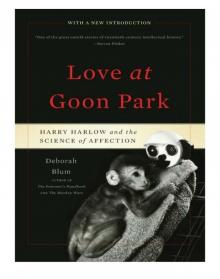 Love at Goon Park: Harry Harlow and the Science of Affection
Love at Goon Park: Harry Harlow and the Science of Affection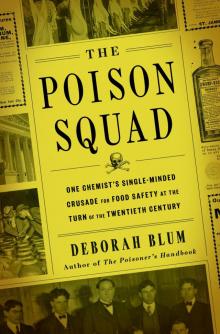 The Poison Squad
The Poison Squad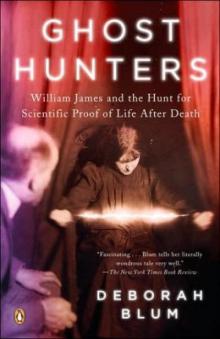 Ghost Hunters: The Victorians and the Hunt for Proof of Life After Death
Ghost Hunters: The Victorians and the Hunt for Proof of Life After Death The Poisoner's Handbook
The Poisoner's Handbook Angel Killer
Angel Killer The Best American Science and Nature Writing 2014
The Best American Science and Nature Writing 2014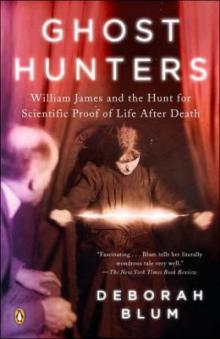 The Ghost Hunters
The Ghost Hunters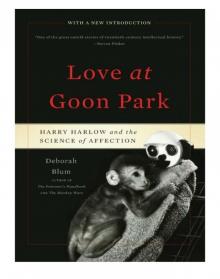 Love at Goon Park
Love at Goon Park